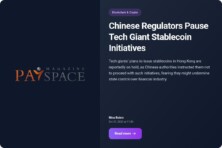China will significantly increase the issuance of government debt obligations to offer subsidies to people with low income, support the real estate market, which has recently been in a crisis condition, and replenish the capital of state-owned banks.

Beijing expects that the implementation of the mentioned decision will contribute to the revival of economic growth, which is showing signs of a gradual slowdown. It is worth noting that currently the economic system of the Asian country, which is the second largest in the world, is not going through the best period in its history. Many experts and analysts expected that an active recovery would begin in China after the lifting of restrictive measures imposed due to the coronavirus pandemic, which became a factor in slowing down or even in some cases paralyzing processes in the business environment and the industry area. These assumptions have never become a fact of objective reality. At the same time, the Asian country’s economy is still on an upward trajectory. However, this fact does not negate the insufficient degree of intensity of the corresponding process. Currently, China’s economy is facing problems such as the already above-mentioned crisis in the real estate sector, weak consumer demand, and falling investor confidence. It is worth noting that last month the authorities of the Asian country announced a set of measures aimed at revitalizing the economic system. At the same time, there is no guarantee that these solutions will generate the most effective result.
In the first quarter of 2024, the Asian country’s economy showed growth of 5.3% year-on-year. Then the pace of the corresponding upward dynamic slowed down. In the second quarter of 2024, the world’s second-largest economy grew by 4.7% year-on-year. It is worth noting that in this case, Beijing’s target is about 5%. The mentioned indicator implies the level of economic growth that the Chinese authorities want to see year-end 2024 and which the leadership of the Asian country assesses as favorable.
The new fiscal stimulus, which implicates a significant increase in the issuance of government debt obligations, was announced by Chinese Finance Minister Lan Foan during a news conference last weekend. He did not detail this plan, noting that Beijing has a relatively big room to implement the relevant intention.
Against the background of deflationary pressure from factors such as the crisis in the real estate sector and weak consumer activity, a state of affairs has emerged in which China is faced with excessive dependence on exports. It is worth noting separately that this situation is observed at a time when there is an increase in tension in the space of geopolitics, which extends, among other things, to the area of world trade.
The data on the dynamic, the world’s second-largest economy, in recent months, does not match the forecasts of experts who have more positive expectations compared to the actual results. Against this background, there is an increase in concern among investors and economists. The corresponding sentiment is related to the fact that the Chinese government’s economic growth target is under threat from the perspective of attainment of this figure. If the further dynamic of the relevant situation is negative, there may be a potential risk that the world’s second-largest economy will face what can be described as a long-term structural slowdown.
According to media reports, citing experts, data for September will testify to the continued weakness of China’s economic system.
At the same time, Zheng Shanjie, the chairman of the National Development and Reform Commission (NDRC), said he was confident that the economic growth target set by Beijing for 2024 would be met.
It is worth noting that recently fiscal stimulus measures in the Asian country have become the subject of intense speculation in the global financial markets. To a large extent, the relevant situation is related to the fact that the relevant measures have been announced. Traditionally, Beijing, as a political center, either refrain from additional comments on the economic situation or seeks to declare an optimistic attitude in the context of this issue. At the same time, the fact that the authorities of an Asian country have decided on stimulus measures is a very important signal without additional clarifications and explanations. This decision means that Beijing recognizes the difficult economic situation that requires action. By some observers, the incentive measures were perceived as a manifestation of a kind of sense of urgency. In this case, it implies the need to act against the background of increasing economic difficulties.
After the stimulus measures were announced, Chinese stock indexes rose by 25% within a few days. In this case, an upward dynamic, which is a two-year high, was recorded. Over time, the positive reaction to Beijing’s willingness to improve the economic situation weakened, after which nervousness related to the lack of further details about the Asian government’s plans for additional spending became a more widespread mood in the context of the relevant issue.
Last month, the media reported on China’s intention to issue special sovereign bonds worth about 2 trillion yuan ($284.43 billion) this year as part of new fiscal stimulus measures. The journalists noted that half of this amount will be used to help local governments solve their debt problems. The media also reported that the second half of the amount is intended to subsidize purchases of home appliances and other goods, to pay a monthly allowance of about 800 yuan per child to all households with two or more children.
Moreover, journalists have released information according to which Beijing is considering the possibility of injecting capital worth up to 1 trillion yuan into the largest state-owned banks. According to the media, this decision is aimed at increasing the capacity of the mentioned financial institutions to support the economy, including through the issuance of new sovereign bonds.
It is worth noting that, as part of traditional practice, the additional issuance of debt obligations in China must be officially approved by the parliament, which is expected to meet in the coming weeks.
Currently, the central bank of the Asian country is embarking on monetary support measures for the economy, which are the most aggressive since the coronavirus pandemic. As part of this approach, the People’s Bank of China provides numerous solutions aimed at helping the real estate sector cope with the downturn that has been observed for several years. It is worth noting that the negative state of affairs in the mentioned sector is a constraining factor in terms of economic growth prospects. One of the specified measures of the central bank of an Asian country is the cutting of mortgage rates.
The announced measures to stimulate the Chinese economy have become a factor of positive impact on the dynamic of local stocks. At the same time, there is a widespread view among analysts that Beijing should begin to decisively address more deeply rooted structural issues, such as boosting consumption and reducing its reliance on debt-fueled infrastructure investment.
Most of China’s fiscal stimulus is going into investment, but the return in this case is dwindling. At the same time, the spending has saddled local governments with $13 trillion in debt.
Lan Foan said Beijing will support local governments in solving their debt problems, noting that they still have to spend a combined 2.3 trillion yuan in the last three months of the current year, including debt quotas and unused funds. According to him, local governments will be allowed to repurchase unused land from property developers.
High youth unemployment, low wages, and a feeble social safety net mean that household spending in China accounts for less than 40% of annual economic output, which is about 20% below the global average. For example, investments are 20 points higher.
A private report from the Zhaopin recruitment platform indicates that the average pay offered by recruiters in 38 major Chinese cities decreased by 2.5% in the third quarter of the current year compared to the previous quarter.
Swedish furniture retailer Ikea, whose 39 stores in the Asian country are facing the consequences of the crisis in the real estate market, called on Beijing to deploy further measures to stimulate economic activity.
It is worth noting that the current problems do not mean that the world’s second-largest economy is doomed. At the same time, an untimely response to problems can cause a crisis that could have been avoided.









